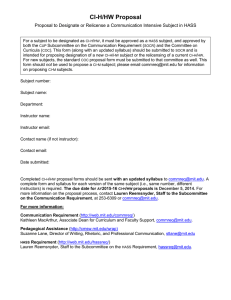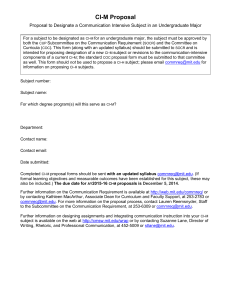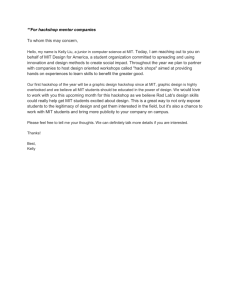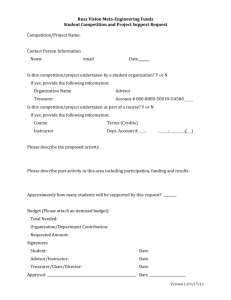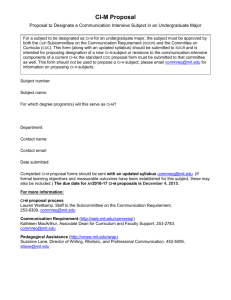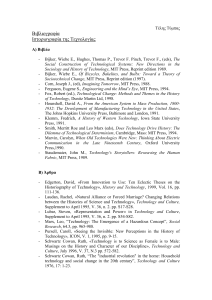CI-H/HW proposal form
advertisement
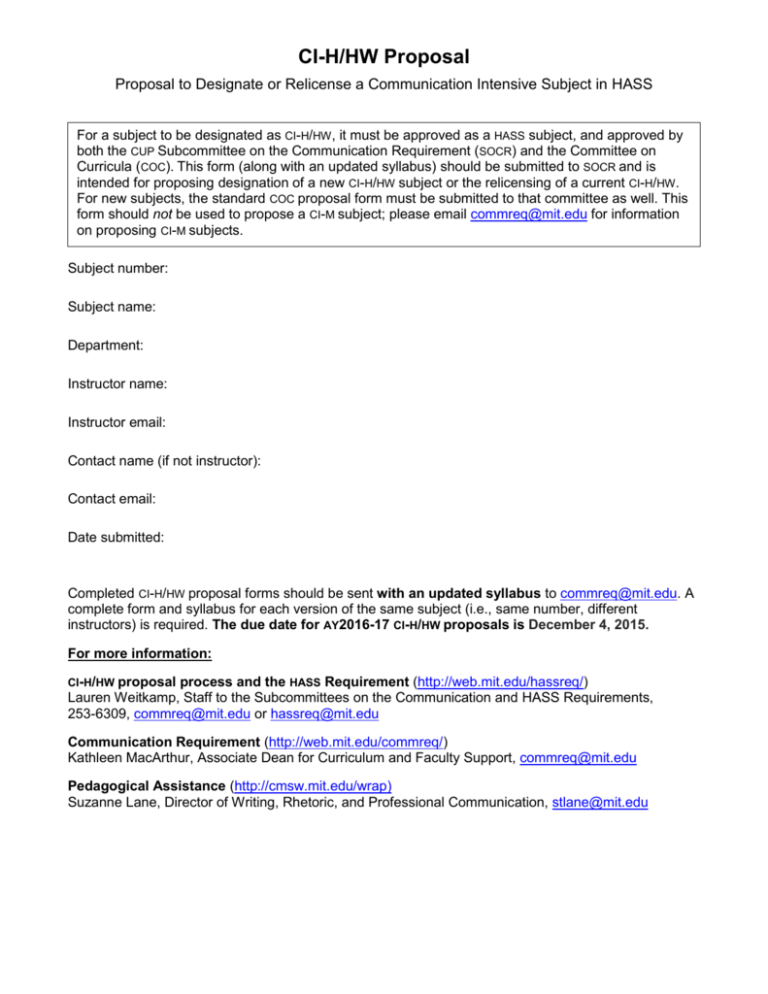
CI-H/HW Proposal Proposal to Designate or Relicense a Communication Intensive Subject in HASS For a subject to be designated as CI-H/HW , it must be approved as a HASS subject, and approved by both the CUP Subcommittee on the Communication Requirement (SOCR) and the Committee on Curricula (COC). This form (along with an updated syllabus) should be submitted to SOCR and is intended for proposing designation of a new CI-H/HW subject or the relicensing of a current CI-H/HW. For new subjects, the standard COC proposal form must be submitted to that committee as well. This form should not be used to propose a CI-M subject; please email commreq@mit.edu for information on proposing CI-M subjects. Subject number: Subject name: Department: Instructor name: Instructor email: Contact name (if not instructor): Contact email: Date submitted: Completed CI-H/HW proposal forms should be sent with an updated syllabus to commreq@mit.edu. A complete form and syllabus for each version of the same subject (i.e., same number, different instructors) is required. The due date for AY2016-17 CI-H/HW proposals is December 4, 2015. For more information: CI-H/HW proposal process and the HASS Requirement (http://web.mit.edu/hassreq/) Lauren Weitkamp, Staff to the Subcommittees on the Communication and HASS Requirements, 253-6309, commreq@mit.edu or hassreq@mit.edu Communication Requirement (http://web.mit.edu/commreq/) Kathleen MacArthur, Associate Dean for Curriculum and Faculty Support, commreq@mit.edu Pedagogical Assistance (http://cmsw.mit.edu/wrap) Suzanne Lane, Director of Writing, Rhetoric, and Professional Communication, stlane@mit.edu CI-H/HW Proposal for AY2016-2017 Catalog The criteria for CI-H/HW subjects may be found at: http://web.mit.edu/commreq/faculty ci-h.html All Communication Intensive Subjects in HASS (CI-H/HW) must include: o at least 5,000 words of writing typically divided among three to five assignments, distributed reasonably across the semester. o at least one assignment that is revised and resubmitted. o an assessed oral component. In order to guarantee sufficient attention to student writing and ample opportunity for oral expression, all sections of CI-H/HW subjects must be capped. The communication activities are expected to comprise the substantial majority of the grade. General information 1. Has this subject been approved for the HASS Requirement? Yes No If no, please contact Lauren Weitkamp, Staff to the Subcommittee on the HASS Requirement, at 253-6309 or hassreq@mit.edu. 2. Term(s) offered. Check all that apply: Fall Spring 3. Designation Requested: CI-H CI-HW 4. What teaching format will this subject use? Please note, in order to guarantee sufficient attention to student writing and ample opportunity for oral expression, the maximum number of students per section is 18, except when a subject is taught without sections (where the faculty member in charge is the only instructor). In this case, enrollment can rise to 25 if a writing advisor is attached to the subject. Lecture with recitations, with a writing advisor (18 per recitation) Small seminar capped at 18 students (or 25 if a writing advisor is assigned) Team-taught by 2 or more faculty, or taught in sections of 18 by 2 or more faculty Add any relevant information about teaching format: Revised by the Office of the Communication Requirement, September 2015 Page 2 of 5 CI-H/HW Proposal for AY2016-2017 Catalog Communication content of proposed CI-H/HW subject Desired outcomes for all CI-H subjects: Students are familiar with the different elements of the writing process (e.g., pre-writing, drafting, revising, and editing). Students’ work reflects an awareness of the rhetorical dimensions of writing—the audience for whom one is writing, and the purpose for which one is writing (e.g., to argue, inform, persuade, explain, or convince). Students approach a writing assignment as a series of tasks, including evaluating, analyzing, and synthesizing appropriate sources. Students apply the appropriate conventions of documenting and citing sources. Students demonstrate improvement in their oral communication skills. In addition to the outcomes specified for CI-H subjects, CI-HW subjects have the following desired outcomes: Students demonstrate the ability to address effective paragraph construction and major trouble spots in grammar, mechanics, and style. Students demonstrate the proper use of research materials and sources, including strategies for effective paraphrasing. 5. Please indicate whether the subject is new, existing and seeking CI-H/HW designation for the first time, or due for relicensing. If this is an existing subject seeking CI-H/HW designation for the first time, please describe the modifications to the subject as they relate to the communication-intensive activities: 6. Describe briefly the educational objectives of this subject and explain how the communicationintensive activities will contribute to achieving these objectives: 7. Describe the instruction in communication concepts and practices and who will provide it. Students should receive explicit communication instruction before they complete written and oral communication assignments. While feedback on communication assignments is invaluable, it should not serve as the only form of communication instruction. 8. Describe how in-class instructional activities will help students learn the purposes and processes of writing in this subject: Revised by the Office of the Communication Requirement, September 2015 Page 3 of 5 CI-H/HW Proposal for AY2016-2017 Catalog 9. Please list and describe each of the oral and written communication assignments (including the word count or number of minutes) and when they occur during the course of the semester. Please also attach an updated syllabus for the subject. If more than one instructor teaches this subject during an academic year, a separate proposal form and syllabus from each instructor in the previous year should be submitted. Recommended practices for providing feedback: Students receive timely, careful, thoughtful, and thorough response to work in progress from the instructor to guide them in revision. For example: Instructors may offer response in a variety of ways, from marginal comments, to evaluative letters, to one-on-one meetings or conferences. Peer review often allows students to develop a critical vocabulary and become better readers not only of other students’ writing, but also of their own. CI-H subjects often require a conference with the instructor as a part of the revision process. Many CI-HW subjects require students to revise each assignment after receiving timely feedback from the instructor and/or their peers. Some CI-HW subjects require students to follow an iterative model, requiring many stages of writing that build upon one another and culminate in a paper. Students receive feedback on their oral communication. For example: Instructors may offer feedback in a variety of ways, from email, to evaluative letters, to conferences. Guided peer feedback on oral presentations helps students to become better communicators themselves. Asking students to complete a rubric or checklist may guide their feedback. 10. CI-H/HW subjects must require each student to significantly revise and resubmit at least one written assignment based on feedback. This revision will not count toward the total word count. Separate grades will be given for the paper and the revised paper. Both grades will count towards the final grade. Instructors will determine the weighting of the grades. Please indicate which assignment(s) will be revised, and when during the term the revision(s) will occur: What kind of feedback will be provided and by whom? How long will the students have to incorporate feedback and work on a revision before they submit the revised assignment? How will the revision count toward the final grade? Revised by the Office of the Communication Requirement, September 2015 Page 4 of 5 CI-H/HW Proposal for AY2016-2017 Catalog 11. The communication activities of each CI-H/HW subject are expected to comprise the substantial majority of the final grade. Describe how the communication assignments and activities of the subject will comprise the final grade given to students. Resources to support communication-intensive activities 12. The Writing, Rhetoric, and Professional Communication Program can provide pedagogical assistance in developing a CI-H subject. Are you interested in assistance in any of the following areas: (i) integrating communication-intensive activities into your course design, (ii) assignment development, (iii) communication instruction or (iv) evaluation of communication assignments? Yes No If yes, please describe what type of assistance you are seeking: 13. Writing advisors can be attached to CI-H subjects with enrollments exceeding 18 students (or exceeding 18 students per section, for team-taught subjects). CI-H subjects without a writing advisor assigned must be capped at 18 students per section. If you are interested in teaching this subject with the assistance of a writing advisor (a speciallytrained lecturer in Writing, Rhetoric, and Professional Communication), you must submit a separate proposal to request a writing advisor. For more information, please contact Suzanne Lane, Director of Writing, Rhetoric, and Professional Communication, at 452-5009 or stlane@mit.edu. Please indicate whether or not you plan to request a writing advisor. Yes No Additional remarks Revised by the Office of the Communication Requirement, September 2015 Page 5 of 5
